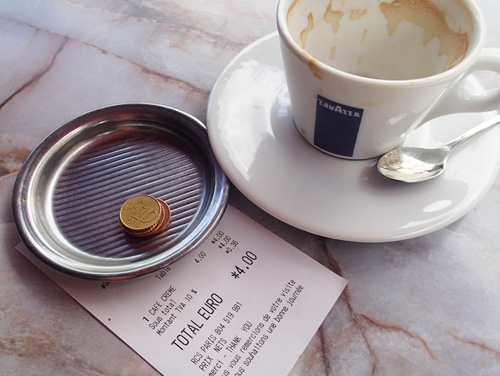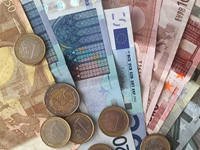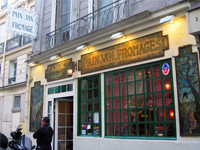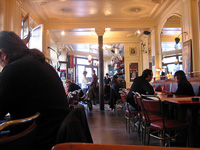Tipping in Paris

Boy oh boy, do I ever get asked about tipping a lot! This is an important thing to figure out when you're visting any foreign country, and Americans are often relieved to find out that it's normal to tip less in France than we do in the States, which might seem counter-intuitive since Paris is such an expensive city. Anyway, once you know the rules, it's easy...
Tipping in restaurants
Believe it not, you never have to tip your server in any French café/restaurant, because the tip and tax are reflected in the prices of all items on the menu and therefore are included in the bill. As an American who believes in being a very generous tipper back home, this was a really difficult adjustment for me in France. It's considered polite to leave a small tip of a few coins if the service was good, but this is not at all necessary. For something small like a coffee or a glass of wine, it's pretty customary to leave the change on whatever bill you used; if the bill comes to 4.65 Euros, you pay with a five, receive 35 centimes change, and leave that on the table as a tip. But again, even this isn't necessary. When dining out, I usually leave a Euro coin (or even two) as a tip, but many of my French friends find this to be too generous, even foolish. I just can't completely break myself of the habit of wanting to show my appreciation and be a good tipper. Incidentally, leaving 15% or more like we do in the States would be downright insane, and even I understand that now. American tourists do sometimes leave tips this large during their first few days in France (that is, until they figure things out), and I'm sure the servers absolutely love them for it, but it really isn't necessary.
Fyi, because tipping isn't as important in France, there's no line to write your tip on the bill when paying by credit card. There's no way to tip with your card; you have to have coins on you, or you can't tip. You could try asking for change for a bill just so you can leave a tip, but the idea of going out of you way to leave a tip might seem so foreign to a French server that they might not understand you!
If you do choose to tip, it's customary to leave the coins after your pay your bill, usually on the little plastic tray that your change is brought out on. If there's no plastic tray, just leave the coins on the table on your way out. If you're in a bit of a hurry and don't need change, you can just give the check with your payment (plus any extra, if you so choose) to the server and say, "C'est bon, merci" ("say bone, mare-see"); you're telling them basically, "it's fine, no change, thanks." A little wave of the hand works wonders to illustrate your point. If you like speaking French and want to try a more challenging version, you can say, "Gardez la monnaie" — keep the change.
Something to keep in mind is, in this system where tipping isn't mandatory and servers are paid a living wage, Americans might find that typical service in a French restaurant leaves something to be desired. Think about it; in the States, servers are paid next to nothing by the restaurants and rely almost completely on their customers' tips. From the moment they lay eyes on you, it's in their best interest to create a relationship with you and give you very attentive service; they'll smile, tell you their name, ask how you're doing, come back to your table many times to see if you need anything, and generally act happy to be serving you and interested in providing you with a good dining experience. They absolutely need to do this, because all of this influences how much money they're going to make for the hour or two of their time that they're giving you. Now, imagine a scenario where the server is paid well and isn't expecting a tip under any circumstances. Their job is (for the most part) simply to ask what you want to eat, and then bring it to you. No name, no smile, no checking if you want your water refilled. It's often hard to get their attention, and you might have to remind them several times for things like water, because water is free and not going to influence your check total, i.e. not going to make them any more money. Think about other jobs where no tipping is involved — the lady at the supermarket checkout, the guy in the hardware store — would that person tell you their name and ask if you need anything five times? They just do their job, and we appreciate it and don't expect anything above and beyond their normal duties.
This difference in the dining and tipping system is, in my opinion, the number one reason that Americans have given the French the stereotype of being rude. We come to Paris on vacation and have few interactions with French people outside of the service industries, and most of our interactions are with waiters in cafés and restaurants. We notice that the servers aren't often smiling, they may seem rushed or distracted, and they're often hard to find when you need them during the meal. We then fail to realize that all of this just comes from the fact that they're not working for tips, and that the friendliness of American servers is mostly a mercenary trait, since every smile, every refill of a glass, is done with the hopes of adding another percentage or two to the overall tip you'll give them. So Americans in Paris have two or three interactions per day with servers in cafés, and they form an opinion of all French people based on the fact that their waiters weren't very friendly, not realizing that this is simply because they're not paid to be.
(A side note: I think a lot of Americans then take this a step further and think the waiters are specifically being unfriendly to them because they're Americans, and then you get the double stereotype of the French being rude and hating Americans. Neither of these are true, and it's amazingly ethnocentric — not to mention paranoid — for us Americans to think that the French know or care that we're Americans and are making the conscious decision to treat us differently.)
Anyway, I'm getting way off my main topic of tipping, but that's my theory on all of this. And of course there are also exceptions all around; I've had plenty of waiters in France who were just as friendly as American waiters. Oftentimes in a smaller place your server will be the owner, and in this case they'll be much more likely to be friendly and take their time with you, since they'll be much more likely to take pride in the quality of your dining experience. Also, of course, in more expensive restaurants, the waiters may be expected by their boss to treat the clientele with politeness and patience, but this is just because it's the rules and they're being paid to do so.
I hope that helps unravel the mystery of tipping in France! Now, some guidelines for some other tipping situations...
Tipping in taxis
This is a bit different than restaurants; it's customary to tip your taxi driver around 10%, but this isn't absolutely required. I usually tip a euro if the ride was under ten euros. Going to or from the airport to Paris usually costs me about 45 euros, and I usually tip five.
Tipping in theaters
At the opera, or at any concerts where there's seating (this goes for classical music all the way to rock), if you're seated by an usher it's customary to tip them a couple Euros. If you forget or you're not aware of this, they may even tell you! It's not a scam, you really are supposed to give them something.
At the movies, there's definitely no tipping in large, modern movie theaters, but some of the smaller, more old-fashioned movie theaters still have ushers, whom you should tip 50 centimes or a Euro.
Tipping for coatcheck
If there's a free coatcheck, tipping 50 centimes or a Euro is fine. Of course, if you have to pay for the coatcheck (like if there's a price noted on a sign) then there's no need to tip on top of that.
Tipping for restroom attendants
Many public restrooms in Europe have an attendant at a desk outside; you'll see this occasionally in big places like malls, airports, etc. It's this person's job to clean the restrooms, and they always have a little bowl or tray on their desk where you're expected to leave some coins. Often there's a sign telling you specifically how much you have to leave (usually 50 centimes or so), but sometimes it's up to you to leave what you want. Usually you're expected to leave your coins on the way in, but sometimes I've seen locals leave their coins on the way out.
When in doubt, I say, leave a little extra! You're on vacation!


 Money! Euros, ATMs, the exchange rate, etc.
Money! Euros, ATMs, the exchange rate, etc.
 Cool restaurants in Paris
Cool restaurants in Paris
 A general note about cafés, bars, and restaurants
A general note about cafés, bars, and restaurants